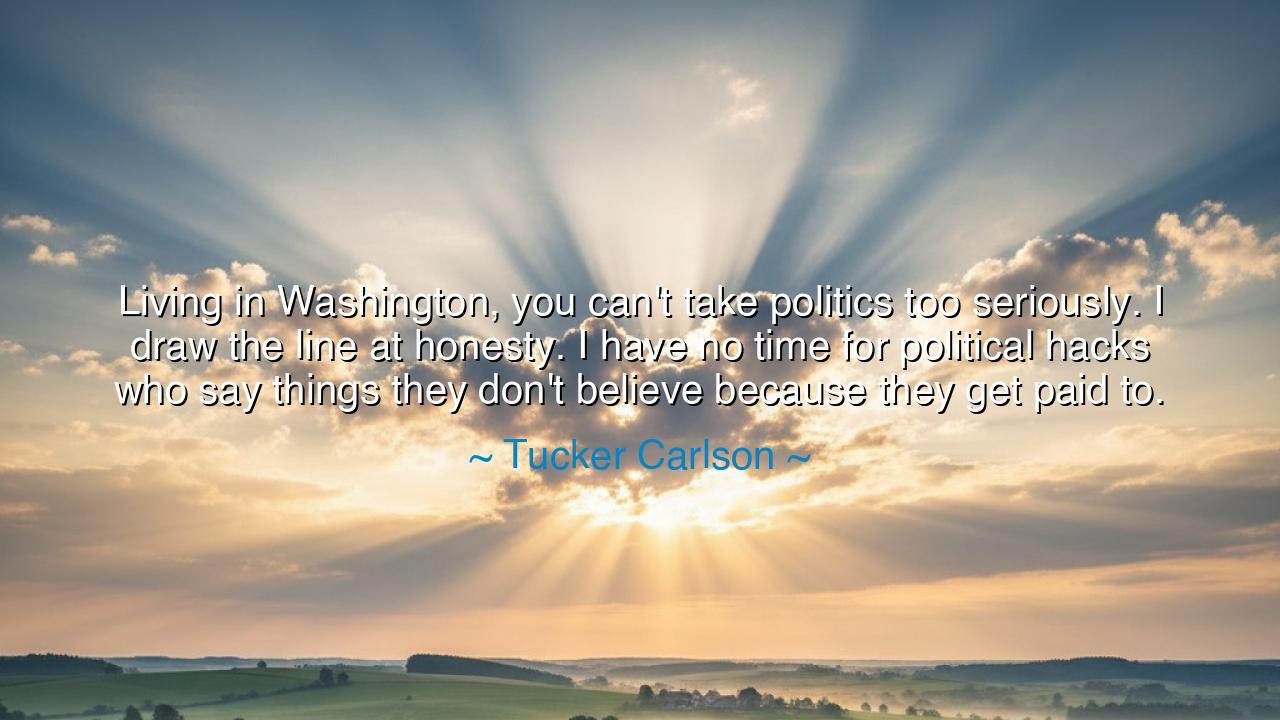
Living in Washington, you can't take politics too seriously. I
Living in Washington, you can't take politics too seriously. I draw the line at honesty. I have no time for political hacks who say things they don't believe because they get paid to.






The words of Tucker Carlson — “Living in Washington, you can’t take politics too seriously. I draw the line at honesty. I have no time for political hacks who say things they don’t believe because they get paid to.” — strike with the sharpness of both satire and warning. He speaks as one who has walked among the halls of power, seen the endless theater of politics, and learned that much of it is but shadow-play. Yet amidst this spectacle, he names honesty as the one unshakable line: the truth must stand, even if all else is corrupted.
The meaning of his words is twofold. First, that one must not let the games of politics consume the soul, for it is a stage filled with pretense, ambition, and contradiction. To take it too seriously is to risk being ensnared in its illusions. Second, that within this theater, the true poison is dishonesty — men and women who sell words they do not believe, who trade conviction for coin. These, Carlson declares, are not leaders but political hacks, hollow vessels whose speech is purchased, not lived.
History gives us clear lessons. Consider the fall of Athens, where silver-tongued demagogues stirred the people with promises they themselves did not believe, leading the city into wars it could not win. Their dishonesty poisoned the republic until trust crumbled. Contrast this with Cato the Younger of Rome, who, though stern and unpopular, refused to speak what he did not believe. His life was rigid, even tragic, but his name endures as a symbol of incorruptible truth. Thus Carlson’s words echo this ancient divide: the false voice leads to ruin, while the honest one may yet preserve dignity.
The origin of his declaration lies in the peculiar crucible of Washington, where politics, media, and ambition intertwine. There, loyalty is often not to truth but to power, and words are weapons sold to the highest bidder. Carlson, both participant and critic, names the hypocrisy he has witnessed: the ease with which truth is sacrificed for career. By setting honesty as his boundary, he attempts to claim a place outside the marketplace of falsehoods.
Therefore, O seekers of wisdom, take this lesson to heart: amidst the noise of politics, laughter may protect the spirit, but truth must protect the soul. Never trust the one who speaks for pay what he would not speak in private. Better to hear the hard truth from a plain tongue than the sweet lie from a gilded one. As Carlson reminds us, the stage of politics may be filled with actors, but the audience — the people — must demand that at least some voices still carry the weight of belief.






CHNguyen Cong Hoa
Carlson’s disillusionment with Washington politics is understandable, but his frustration with political hacks who don’t speak what they believe is interesting. Can we ever truly expect politicians to be honest when they are constantly pressured by their party lines, donors, and media? If honesty was the ultimate priority, would it still be possible to win in such a cutthroat system?
BNBao Ngoc
Tucker Carlson’s view on political hacks makes me wonder: is there really a place for true political honesty in Washington today? The system seems to reward those who can play the game, regardless of their personal beliefs. How much of this is part of the political culture, and how much is a result of the power and money that drive it? Is it even possible to separate politics from money?
BKCao thi bich khue
Carlson’s perspective on politics is refreshingly candid, but it also paints a bleak picture of Washington. Is the problem with politicians themselves, or with the system that incentivizes dishonesty? If we want real change, should we be focusing on fixing the political structures that make dishonesty so profitable, rather than simply criticizing individual politicians?
6T28.lop 6/3.Ng.Khanh Thien
I can see why Carlson draws the line at honesty, especially in the political world where so much is at stake. But does his disillusionment with Washington mean there’s no hope for meaningful change? Is it possible to have a truly honest political environment when people are constantly incentivized to mislead the public in exchange for power and wealth?
ANvan anh nguyen
Carlson’s stance on honesty in politics makes a bold statement. It’s true that many politicians say things they don’t believe just to align with their donors or political agenda. But how much of this is driven by the system itself? Can we really blame individuals when the political machine rewards dishonesty and self-interest? What would it take to break this cycle?